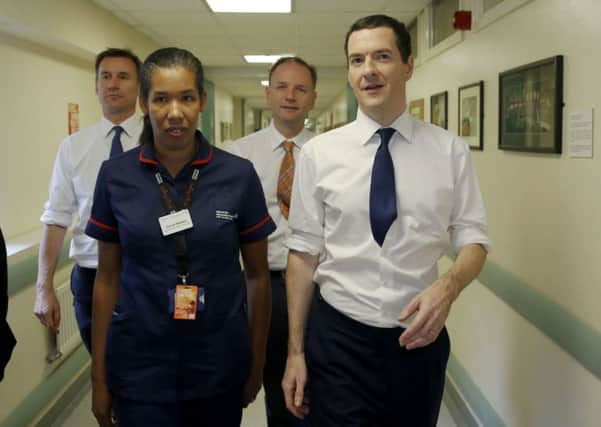Councils cannot afford bill for flood defences


Anne McIntosh, chairman of Parliament’s environment select committee, spoke out following national newspaper reports that Chancellor George Osborne could use Wednesday’s Autumn Statement to pass responsibility for flood protection measures to local authorities.
Even though Mr Osborne says he can afford to find an extra £2bn for the National Health Service because the national economy is performing better than expected, there are fears that no extra money will be made available in the next Parliament for new schemes to protect flood-hit communities because the deficit has only been cut by one third since the coalition came to office in 2010.
Advertisement
Hide AdAdvertisement
Hide AdHowever Miss McIntosh, the MP for Thirsk, Malton and Filey, says the Chancellor needs to think twice before passing the buck to local councils. “County councils and local authorities have a role to play, but there is no way that they can be made responsible for flood defences,” she told The Yorkshire Post.
“I would be very surprised and disappointed if the Chancellor dumped on local authorities at this time. Money for flood risk is a bit like the NHS – there is never enough to go round.”
However Miss McIntosh does accept there is scope for “radical blue sky thinking” on the part of the Chancellor in order to prevent a repeat of the floods that ruined the Somerset Levels and Thames Valley last winter.
She believes privatised firms like Yorkshire Water could be given extra powers to raise money to invest in new schemes – while she would like local drainage boards to have a greater say on the allocation of resources. “We need to look at catchment management and the experience from pilot projects such as the scheme in Pickering,” added Miss McIntosh.
Advertisement
Hide AdAdvertisement
Hide AdHer comments came as senior Conservative and Labour politicians clashed about the state of the public finances ahead of the final Autumn Statement before next year’s general election.
Labour leader Ed Miliband will claim today that the declare that the Tories’ failure to tackle the cost-of-living crisis has cost the Exchequer £116.5bn – leading to higher borrowing and broken promises on the deficit. The Doncaster North MP says that this price tag is the equivalent of £4,000 for every taxpayer.
However the Chancellor insists the country can only afford an extra £2bn for the National Health Service each year because of the Government’s astute handling of the economy. A further £1.1bn to improve under-fire GP services is being funded from the fines imposed on those banks caught up in the Libor rate-rigging scandal.
“Because we have a strong economy and we have got the public finances under control, we can afford to put £2bn into the frontline of the NHS,” declared Mr Osborne.
Advertisement
Hide AdAdvertisement
Hide AdHowever Paul Johnson, of the Institute for Fiscal Studies, said that the Chancellor will have to admit that the public finances are in worse shape than forecast in the Budget.
“Things haven’t gone as well as hoped since March, not in the sense that the economy has done less well than hoped, but because earnings growth has been relatively poor, other tax receipts have been relatively poor,” he told BBC1’s Sunday Politics programme.
He said there would have to be big cuts to other public services in the next Parliament on top of the promized squeeze on working-age benefits.
“The consequence will be that by 2018 we are looking at spending cuts of one-third in a whole slew of public services –local government, police, justice, police, environment – all of these things,” he added.